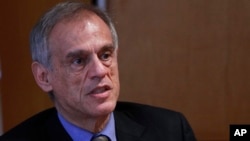Cypriot Finance Minister Michalis Sarris has resigned as a judicial panel prepares to investigate the role that he and others played in a financial crisis that pushed the eurozone member to the brink of bankruptcy.
Sarris submitted his resignation Tuesday, saying it was an appropriate step given the need to cooperate with the three-judge commission set up by the government earlier in the day. He previously served as chairman of Cyprus' second largest lender Laiki Bank, whose risky investments led to its break-up last month under the terms of an international bailout for the Cypriot economy.
Sarris, who was appointed finance minister in February, also said he had accomplished the main task of his brief tenure.
"As you know I took over the finance ministry in order to carry out our work, with the first goal being the agreement of the bailout," he said. "I believe with great effort this has succeeded."
Cypriot President Nicos Anastasiades accepted Sarris' resignation and appointed Labor Minister Haris Georgiades to the finance portfolio.
The Cypriot government said Tuesday that it had finalized the terms of the $13 billion bailout with international creditors. It said the final agreement gives Cyprus an additional two years to fulfill the deal's requirements to improve government finances, with 2018 set as the deadline.
In return for the aid, international creditors forced Cyprus to agree that depositors with more than $130,000 at the Bank of Cyprus, the nation's largest, would lose up to 60 percent of their savings. Cypriot officials said Tuesday the creditors have agreed to let those depositors access one-quarter of the remaining funds, with the rest to be unblocked later.
The judicial panel appointed by the Cypriot president will examine political and regulatory failures that led Nicosia to seek the bailout from the European Union, the European Central Bank and the International Monetary Fund.
Anastasiades urged the judges to look at his own business dealings and those of his relatives as part of the investigation. Local media have reported allegations that the president's family members used inside information to take money out of the country before deposits were locked down by the bailout deal.
The island nation's central bank also took a step to ease the financial pain of Cypriots on Tuesday, partially relaxing transaction controls aimed at preventing a massive flight of money from the banking system.
The central bank raised the ceiling on transactions not requiring its approval from $6,400 to $32,000, and authorized the use of checks worth up to $11,500. Other restrictions on money transfers remain in effect. The Cypriot government imposed them last week, as banks re-opened following a two-week shutdown prompted by fears of a run on deposits.
Sarris submitted his resignation Tuesday, saying it was an appropriate step given the need to cooperate with the three-judge commission set up by the government earlier in the day. He previously served as chairman of Cyprus' second largest lender Laiki Bank, whose risky investments led to its break-up last month under the terms of an international bailout for the Cypriot economy.
Sarris, who was appointed finance minister in February, also said he had accomplished the main task of his brief tenure.
"As you know I took over the finance ministry in order to carry out our work, with the first goal being the agreement of the bailout," he said. "I believe with great effort this has succeeded."
Cypriot President Nicos Anastasiades accepted Sarris' resignation and appointed Labor Minister Haris Georgiades to the finance portfolio.
The Cypriot government said Tuesday that it had finalized the terms of the $13 billion bailout with international creditors. It said the final agreement gives Cyprus an additional two years to fulfill the deal's requirements to improve government finances, with 2018 set as the deadline.
In return for the aid, international creditors forced Cyprus to agree that depositors with more than $130,000 at the Bank of Cyprus, the nation's largest, would lose up to 60 percent of their savings. Cypriot officials said Tuesday the creditors have agreed to let those depositors access one-quarter of the remaining funds, with the rest to be unblocked later.
The judicial panel appointed by the Cypriot president will examine political and regulatory failures that led Nicosia to seek the bailout from the European Union, the European Central Bank and the International Monetary Fund.
Anastasiades urged the judges to look at his own business dealings and those of his relatives as part of the investigation. Local media have reported allegations that the president's family members used inside information to take money out of the country before deposits were locked down by the bailout deal.
The island nation's central bank also took a step to ease the financial pain of Cypriots on Tuesday, partially relaxing transaction controls aimed at preventing a massive flight of money from the banking system.
The central bank raised the ceiling on transactions not requiring its approval from $6,400 to $32,000, and authorized the use of checks worth up to $11,500. Other restrictions on money transfers remain in effect. The Cypriot government imposed them last week, as banks re-opened following a two-week shutdown prompted by fears of a run on deposits.





